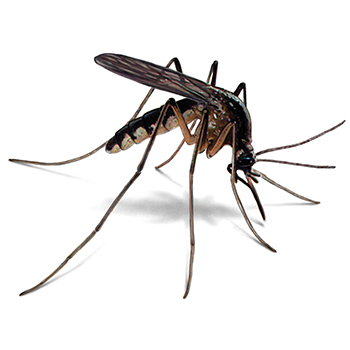Delaware Mosquito Control and Extermination

Mosquitoes can be one of the most common — and irritating — pests. You’ll recognize the signature, high-pitched hum and itchy bites of mosquitoes, which is virtually everywhere in the world, including Delaware. However, even though mosquitoes may seem like a relatively minor irritation, they can carry several serious diseases, some of which can be fatal, such as Zika virus and West Nile virus. To protect your Delaware home or business from mosquitoes, you need to learn about the behavior of this pest, take steps for prevention, and find effective treatment options should an infestation occur.
What Are Mosquitoes?
Mosquitoes are flying insects known for biting and feeding on blood, and in Delaware, there are over 50 different species. For most of their victims, almost immediately after mosquitoes bite, a round and puffy bump forms. For humans, this is usually followed by itching. The Delaware pest control experts at Viking Pest explain the males feed off of sugar and nectar, while the females are the ones that feed off of blood so they can produce eggs. Mosquitoes can be bothersome, yet a serious problem in your home or business in Delaware. Mosquitoes can pose a threat to humans and animals because of their ability to transmit diseases and infections. Some of the illnesses that mosquitoes are capable of transmitting are malaria, yellow fever, dengue, West Nile virus, and the Zika virus. In recent years, various forms of encephalitis have been transmitted by mosquitoes. For example, cases of Eastern equine encephalitis, commonly called Triple E, have been found in Delaware.
How to Identify Mosquitoes
Mosquitoes range in size from 1/8 of an inch to 1/3 of an inch long and they have small heads with large eyes, abdomen, thorax, two wings, and six slender legs. Mosquitoes can be gray, black, brown, or green, and sometimes their bodies can have iridescent blue scales with white stripes across their abdomens. Both male and female mosquitoes feed on nectar and plant juices, while females are the ones that need to feed on the blood of mammals, birds, fish, reptiles, and amphibians. In order to feed, female mosquitoes use their long proboscis, or nose, to draw out blood. The Delaware pest control experts at Viking Pest explain the life cycle of a mosquito is broken up into four stages: the egg, the larva, the pupa, and then the adult. Once they reach the adult stage, mosquitoes begin to bite, becoming voracious feeders. In a single meal of blood, a mosquito can add up to 140 percent of their body weight.
When Are Mosquitoes Present in Delaware?
Many adult mosquitoes around Delaware often come from breeding sites in close proximity to your home or business. Anywhere water can collect makes for good breeding habitat. Mosquitoes are most common in Delaware during the warmer months of spring and summer and in wetland areas. The Delaware pest control experts at Viking Pest explain since female mosquitoes need meals of blood to reproduce, once they feed, they can then lay eggs directly on the surface of stagnant water or on the edge of containers holding water. From there, the four stages of their life cycle begin. Depending on the species and the temperature, these eggs could reach adulthood in as little as four days. If a female has had plenty of mammals to feed on, it could lay over 100 eggs with each feeding and could lay up to 3,000 eggs in just one week during the warmer months in Delaware.
Mosquitoes in Delaware and other states may multiply quicker if there are several areas around your home or business with standing water, especially in the hottest summer months. This includes everything from clogged rain gutters, old tires, abandoned swimming pools, unused birdbaths, depressions in tarps, flower pots, upturned garbage can lids, discarded soda or paint cans, wheelbarrows, or buckets. All of these, if near your home or business, can cause mosquitoes to breed.
How to Control Mosquitoes in Delaware
The best way to get rid of mosquitoes in your home or business in Delaware is to eliminate areas where they can lay eggs, which is any place with standing water. Even the smallest amount can serve as a breeding ground, such as pools of water from leaking pipes or a broken sprinkler head. If there are places that you need to store water, make sure to change the water regularly. These areas could be outdoor birdbaths or ornamental ponds.
Viking Pest experts explain due to the serious health risks that can come from mosquito bites, it’s highly recommended to seek the assistance of a professional pest control expert to focus on long-term mosquito prevention in your Delaware business or home. Viking Pest uses Yard Guard: Mosquito and Tick Protection to reduce mosquito populations in your Delaware home or business.
Protecting Your Delaware Home or Business From Mosquitoes With Viking Pest Control
Viking Pest offers expert treatment designed to effectively and efficiently control and prevent mosquitoes from invading your home or business in Delaware. Our use of Integrated Pest Management (IPM) techniques focuses on finding the core of the pest concern and controlling mosquitoes from the source. Through IPM, pest control materials are selected and applied in a manner that minimizes risks to human health, pets, and the environment. Call Viking today for your FREE and NO OBLIGATION estimate at 1-800-618-2847 or schedule online today!















